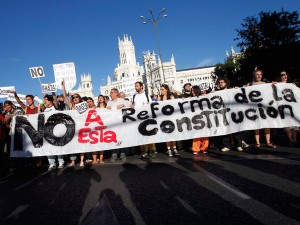Reforming the Constitution is a guaranteed way to open up a thousand and one debates about democracy in Spain. The 1978 referendum, in which the current Constitution was approved, was a turning point at a major crossroads in the political life of a country that aspired to be close to Europe, improve the quality of life of its citizens and take on the process of transitioning to democracy under the guidance of a parliamentary monarchy. To think that reforming the Constitution now is the only way to control the deficit is probably a reflection of the need for a renewal of the policies of the political parties, not necessarily generational change.

The question is poignant: Is a reform of the Constitution the only strategy to guarantee the budget stability of the public administrations? And does stability necessarily mean control? It cannot be denied that the debate has been intense, although greater consensus among political parties would have been useful to ensure a more representative decision. The agreement between the PP and the PSOE enabled the reform: an unusual accord given the difficulties they have in thinking alike on other issues. The rest of the political parties, which, we should not forget, also represent citizens, were mere witnesses to those who, in the name of representation, have taken decisions that affect all of Spanish society.
Most people agree on the need to urgently boost the economy of the country. But critics of the constitutional reform have valid arguments. Firstly, because the agreement was only between the PSOE and the PP, leaving aside the other smaller political parties. Secondly, the speed of the reform that has made impossible a deep and critical debate among citizens and in parliament about the repercussions of controlling the deficit with the Constitution compared to other alternatives such as a new law. The representative democracy exercised in Congress and the Senate is based on analysis, reflection, consultation, debate and voting: a process that requires citizens to be involved in an active debate. And lastly, because of the perception that the reform is being carried out to placate the markets and sectors of the economy: it seems as though the guidance coming from European authorities will decide the economic future of the country. So what about the opinion of citizens?
Democracy is exercised through public debate. Why are citizens’ opinions considered important on some issues while with others the representation provided by Congress representatives is sufficient? Are there no other articles of the Constitution that need to be reformed? What are the limits of members of parliament in representing citizens? What will be the content of the reform? If Spaniards don’t like it, how can we go about reforming the Constitution again? Will the reform contribute to improving the lives of citizens or just the lives of those who need a guarantee to maintain the interest of European and international markets? Time will make the consequences evident, but for the moment it is worth looking at the planned changes to Article 135 of the Constitution.
This article has been translated from Spanish with the author’s permission. Read the original Spanish version here.
Este artículo ha sido traducido del español con el permiso del autor. Lea el original aquí.
Leave a Reply
You must be logged in to post a comment.